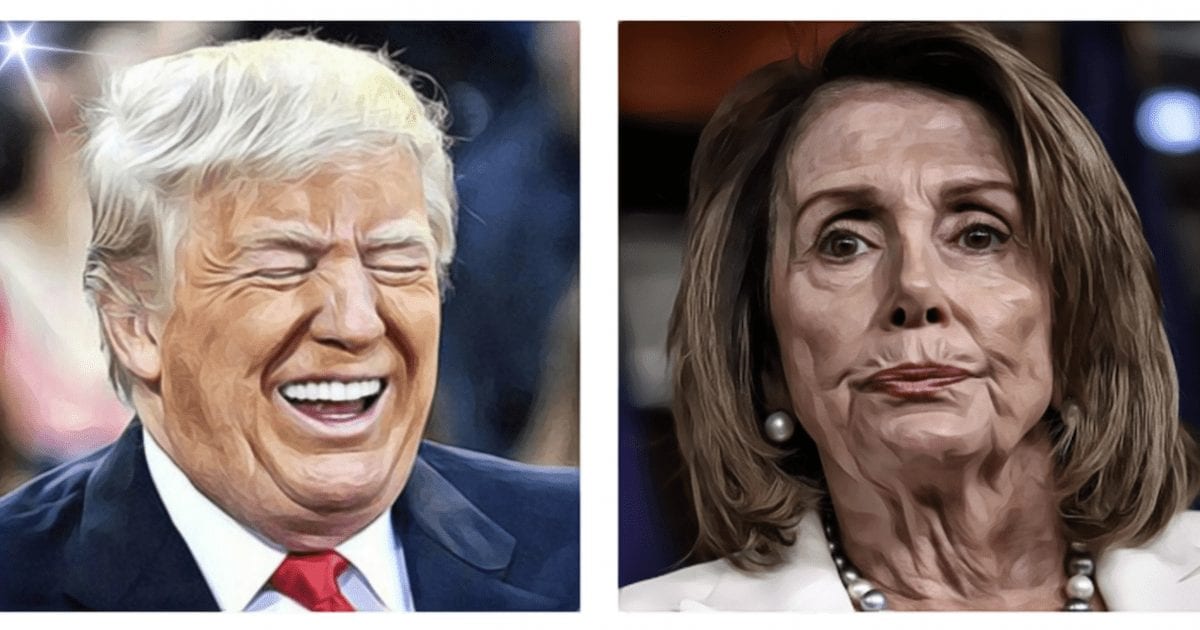These Democrats really are the kings (and queens) of “Do as I say, not as I do”.
In their newest move, they’ve introduced a Bill that among many other things requires Presidents and Vice Presidents to release their tax returns.
The Bill is silent as to Congress, which essentially means Congress is exempt.
Isn’t this Pelosi character the same person who is always spouting off about transparency?
I do have that correct, don’t I?
The high-horse Dems?
Oh yes, here it is:
The Art of the Deal, FINALLY Available on Amazon!
READ MORE >> Is This Donald Trump In The Bible?
That's always such a good idea when it comes to others, just not when it comes to YOU, right Nancy?
Shameful.
The story was initially covered by CNS News:
House Speaker Nancy Pelosi introduced legislation on Friday that would require the president and vice president and candidates for the presidency and vice presidency to release their tax returns.
The bill, however, would not require members of Congress or candidates for Congress to release their tax returns.
The provision is part of H.R. 1—the “For the People Act”—which Pelosi introduced Friday.
A summary of the bill says that it includes a section titled “Presidential Tax Transparency.” This section, says the summary: “Requires sitting presidents and vice presidents, as well as candidates for the presidency and vice presidency, to release their tax returns.”
In 2017, when members of Congress were calling on President Donald Trump to release his tax returns, Roll Call asked all 535 members of the House and Senateto release theirs. As Roll Call reported at the time, 6 members did release their tax returns as requested by the publication. Another 6 had already released theirs elsewhere. Another 45 members, Roll Call reported, had previously and partially released their tax returns. But 473 members had not released their tax returns and did not respond to Roll Call’s request that they do so.
Rep. Nancy Pelosi was one of the members, Roll Call reported, who had not released her tax returns.
At an April 2017 press briefing promoting similar legislation that would have required the president—but not members of Congress—to release their tax returns, Pelosi said that president’s do not have a “right to privacy” when it comes to their tax returns.
““It's not a right to privacy that the President has,” Pelosi said. “He's the president of the United States. There is a question about a Russian connection, politically, personally, financially, to the president; there's concerns about recent actions by the Chinese government in relation to the Trump Organization."
FREE Trump Collector’s Coin….Check Availability
LISTEN >> “Big Bad Don” – The New Trump Battle Song!
It was confirmed by NPR and with more details:
It isn't your usual bill, the For The People Act introduced Friday by House Democrats. Also known as HR 1, symbolically their first legislation, it is a 571-page compendium of existing problems and proposed solutions in four political hot zones: voting, political money, redistricting and ethics.
A pledge to pass the bill was a common theme among Democratic House candidates last year.
"We heard loud and clear from the American people," Rep. John Sarbanes, D-Md., told reporters Friday. "They feel left out and locked out from their own democracy."
If the bill ever becomes law, it's unlikely to happen this year. Republicans control the Senate, President Trump is in the White House, and the GOP vehemently opposes the basic approach of HR 1.
"This is obviously a pretty radical expansion of the regulation of political speech," said David Keating, president of the conservative Institute for Free Speech. "If this bill had become law now," he said, anti-Trump groups "would find it very difficult to speak as effectively as they have over the past two years."
Some of the bill's provisions push the envelope, including reaching into state law. To settle the controversy over redistricting, the bill would simply take away the power of state legislatures to draw congressional districts and have independent commissions do it instead. That way, presumably, the local politicians could no longer gerrymander the districts to help their party and cripple the opposition.
But some other proposals are not surprising. The bill includes an update of the Disclose Act, a pro-transparency measure that Democrats have introduced regularly since 2010 — not that Republicans are any more likely to embrace it than they were back then.
Here's a rundown of the bill's major provisions:
Voting and election laws
- Voter registration would be made easier. Citizens could register online or get registered automatically, via data from driver's licenses or other government sources. For federal elections, states would have to provide same-day registration and at least 15 days of early voting. Election Day would be a federal holiday.
- The bill would crack down on efforts to take voters off the rolls or prevent them from casting ballots. Felons could regain their voting rights after finishing their sentences.
- Federal elections would require paper ballots to prevent computer tampering. State chief election officials couldn't get involved in federal campaigns.
- The bill would declare an intent to revive core anti-discrimination provisions of the Voting Rights Act of 1965 that were effectively shut down by the Supreme Court six years ago. It would also state that failing to vote isn't grounds for taking away a person's voter registration.
Campaign finance
- Provisions from the Disclose Act would expand the prohibition on foreign political money and mandate the disclosure of the big donors behind politically active 501(c)(4) social welfare organizations.
- Digital companies, like Facebook and Google, would have to set up public databases cataloging political ad purchase requests of $500 or more and create new measures to block ad buys by foreign nationals.
- Presidential inaugural committees would have to disclose expenditures, in addition to the existing requirement for donor disclosure. This is a response to reports of unexplained spending by Trump's inaugural committee.
- A new matching-fund program would support House candidates who agree to raise only small-dollar contributions. (Similar provisions for Senate candidates would have to come from the Senate.) The public financing system for presidential candidates, largely irrelevant since 2012, would be updated.
- The bill would quash "sidecar" superPACs that support individual candidates.
Ethics
- Presidents and vice presidents would have to release their tax returns, something that happened routinely in past administrations but not in this one.
- Presidents-elect would need ethics plans for their transition teams and would have to file financial disclosures within 30 days of taking office. The bill would tell presidents and vice presidents they should act as if they are covered by the conflict-of-interest law, which actually exempts them. Again, this wasn't an issue in previous administrations because past presidents did not have the volume of business entanglements that Trump has.
- House members would be barred from serving on corporate boards. Rep. Chris Collins, R-N.Y., is under indictment for allegedly using inside information he gained as a corporate board member.





Join the conversation!
Please share your thoughts about this article below. We value your opinions, and would love to see you add to the discussion!